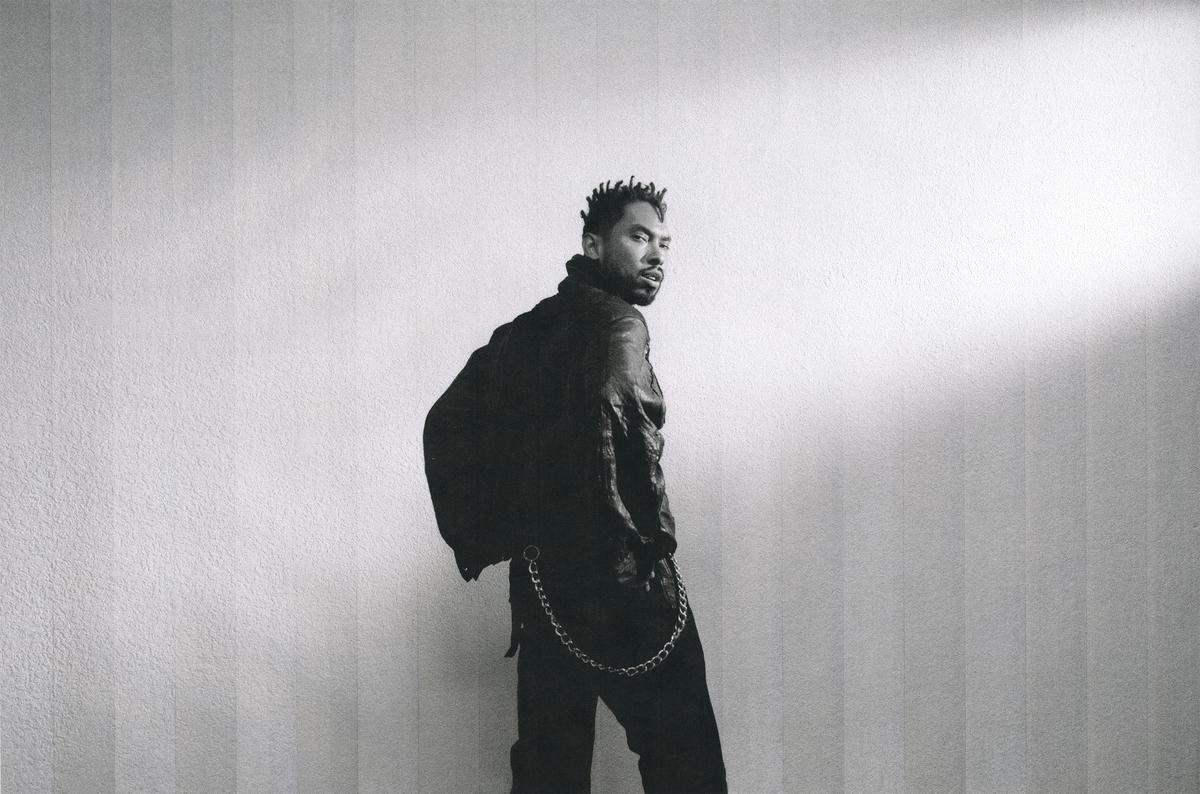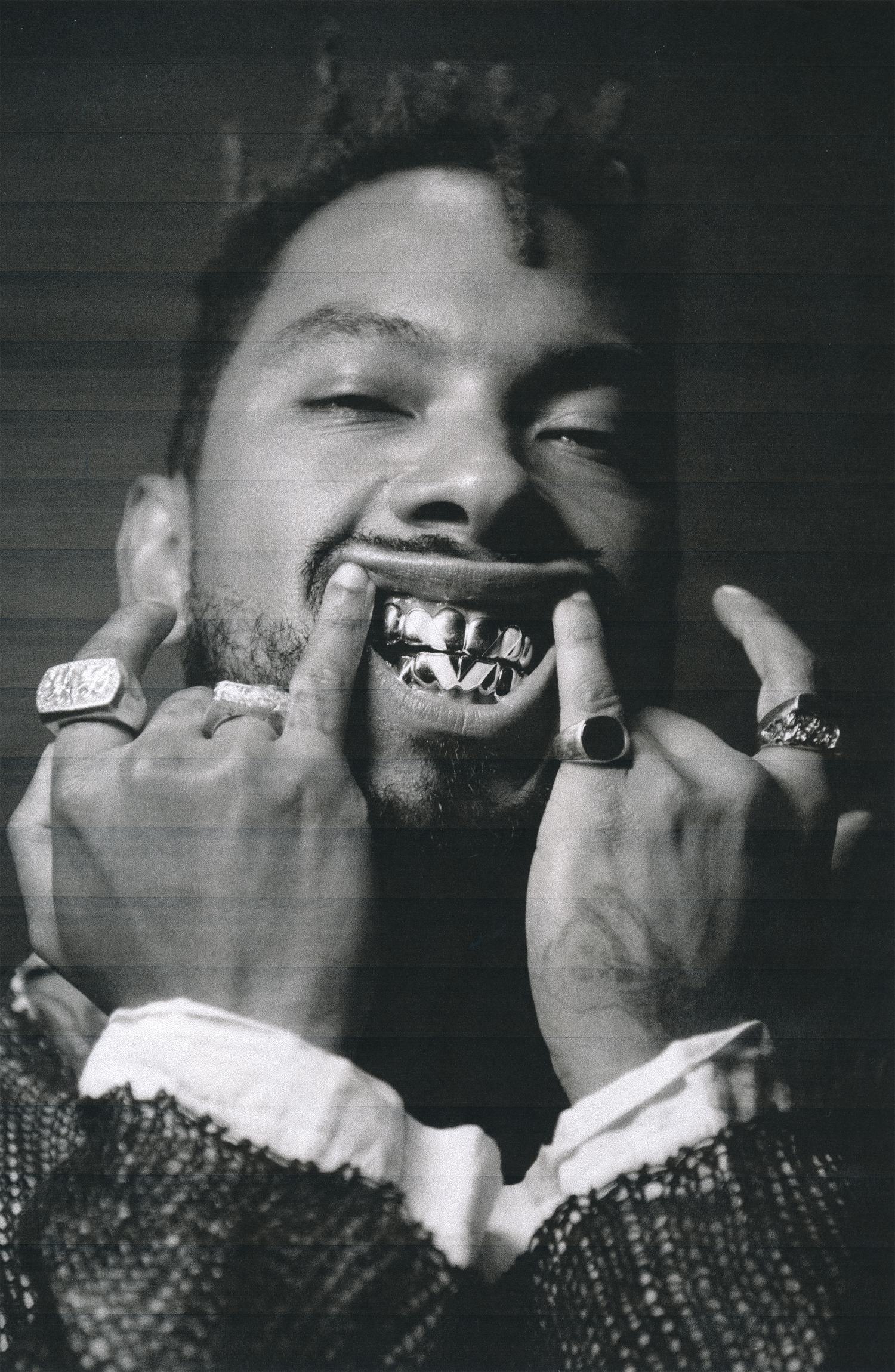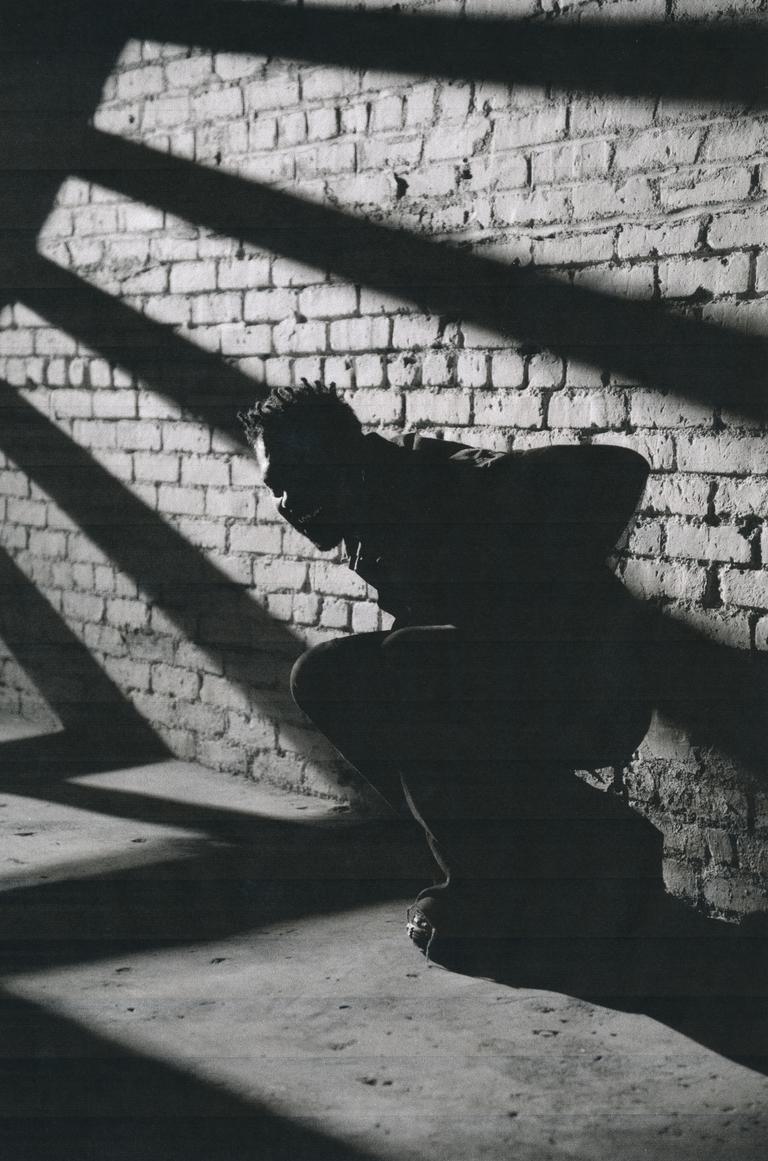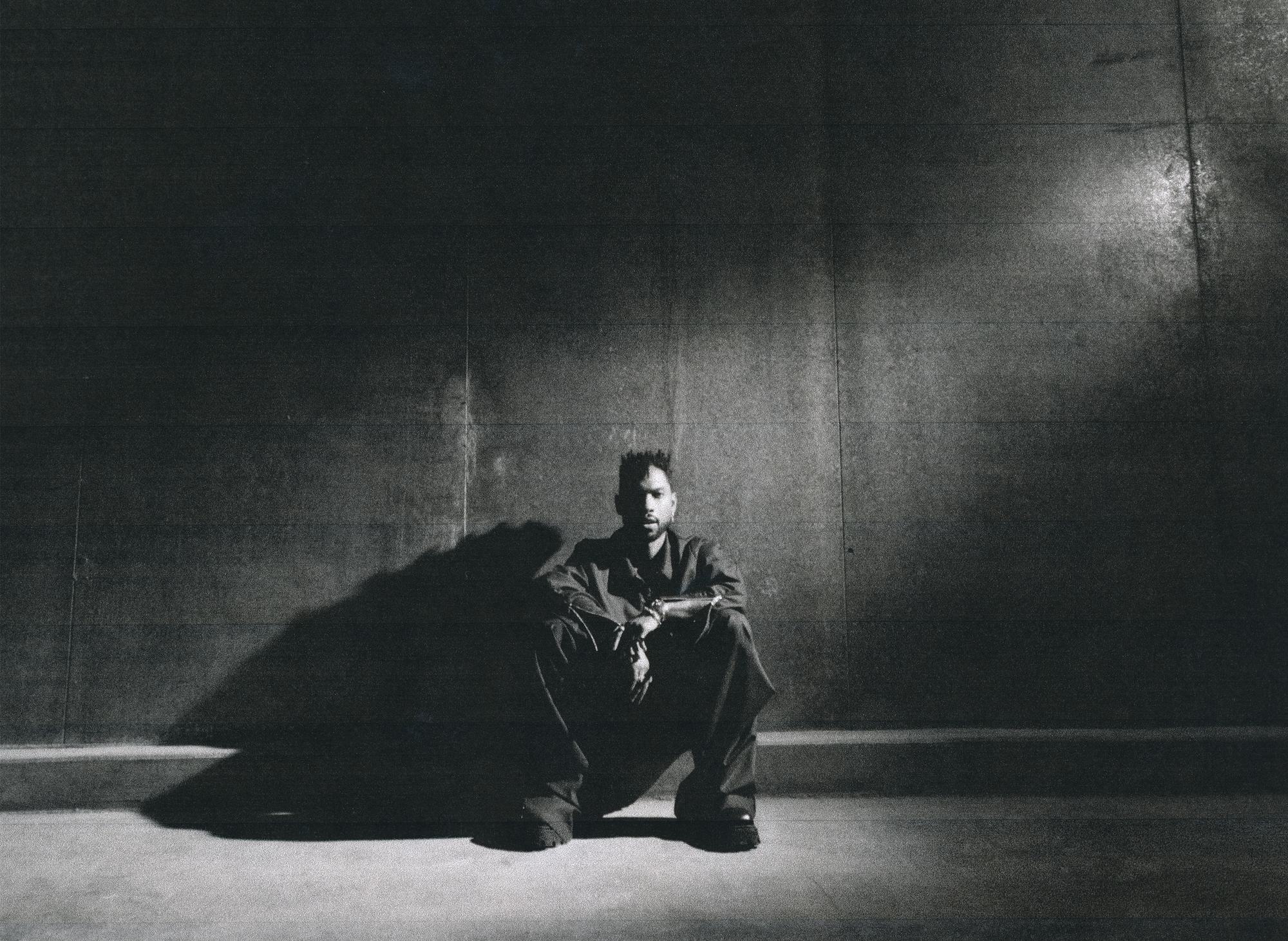
The heart that bleeds
R&B lothario Miguel walks the tightrope between pleasure and pain for Viscera – his fifth, and most confessional album yet. He reflects with Sophie L Walker on the turbulence that brought it to life.
Miguel is walking on air, not for moments but for minutes.
And yet he sings. That voice, a conduit for sensuality that has remained timeless and unmistakable since the turn of the millennium, is somehow impervious to pain. It transcends his sweat-soaked back and his vest streaked with blood; to sing, despite it all, is a statement of Miguel’s astonishing capacity to endure.
The practise of body suspension traces back thousands of years, with its earliest manifestations in Southeast Asian Hinduism and Native American tribes. The act is believed to be a conversation between the mind and the body to reach spiritual enlightenment with pain as the intermediary. Despite the great distance between these ancient cultures, they had discovered the strength of human suspension independently of each other – and today, it flourishes on a universal scale. Some are seeking control over their body; others want to prove to themselves that they are more than their bodies, or are not their bodies at all.
The exploration of pain’s potential from an artist who is the paragon of pleasure is intentionally jarring. His act of suspension was an announcement for his fifth album, Viscera, a spectacle for an invited audience which interrogates our relationship to pain as readily as it dismantles the world’s expectations of Miguel himself and the artist he has evolved to be.

Miguel emerged in 2010 with “Sure Thing”, an aching neo-soul hit (which has just enjoyed a second wave of virality at accelerated TikTok speed). It was an era-defining hit in the RnB canon which commanded the world’s attention and cemented his stardom. But what sustained that attention was his refusal to conform to the cookie-cutter conventions of RnB lotharios: the oil-slicked abs, dirty talk and an attitude that women were to be used and disposed of like Kleenex tissues. His music worshipped at the altar of female pleasure where emotion and partnership served as his biggest turn-on, redefining the lexicon of RnB by being forthright about his vulnerabilities without indulging in the genre’s wallowing narcissism. The guitar-toting California dreamer better belongs to the lineage that followed Prince’s purple reign: flamboyant, funk-driven and entirely at the helm of his own eternally shifting vision.
Over the course of a decade, Miguel’s four records have been voyages into unexpected waters. There is writhing psychedelia and pelvic guitar lines; his voice can soar to breathless climaxes as willingly as it gets down and dirty in the raspy low-end. Electronic delights, Cashmere Cat production, a Tame Impala remix, singing in Spanish to honour the Mexican half of his heritage and political soul-bearing are just a handful of surprises attendant to Miguel’s ambition. These projects, each pushing the parameters of his capability a little further, have been met with vast critical acclaim. But the arrival of Viscera, his fifth record and the first of a new decade, marks a sonic and spiritual departure from any of Miguel’s previous offerings. This is a violent act of reintroduction, the kind that will make you wince.
“I don’t know who’s going to stick around after this…” he reflects. “I’m sure you’ve heard ‘Rope’?” It’s the track he performed at the Viscera Experience through gritted teeth and controlled breath. Compared to his usual sonic hedonism, painting in bold and unpredictable strokes, “Rope” is astonishingly simple: Miguel is alone, backed only by the gentle ushering of a guitar and the snap of fingers; its solitude is such that the emptiness of the room can be felt as if it were an instrument in its own right. His lyrics are dark: “I’m hanging from the ceiling / Rope around my neck / I’m hanging onto something / The walls are closing in.”
It reflects an era of emotional turbulence. The seed of the album was planted in 2018 just after a collision of two life-altering events: losing his grandparents, and his marriage to his then-partner of nearly two decades, Nazanin Mandi. They had met at the age of eighteen on the set of his first music video, “Getcha Hands Up”. Mandi interviewed Miguel for a behind-the-scenes promotional video and ventured the question: “All the ladies want to know, do you have a girlfriend?” The story goes that he smiled and told her, in no uncertain terms, “No, but I’m looking for one.” The pair embodied RnB’s fantasy: that forever might be more than a one-night promise.
“It was my first time experiencing loss,” he reflects. “My grandparents were the glue that held my father’s side of my family together, which is where I experienced tradition and close family bonds. My grandmother on my mom’s side was just diagnosed and was also sick, and here I was getting married and starting this new chapter in my life. It was a lot, and I think it started in a place of dealing with grief that I hadn’t processed yet; it was really confusing because I felt that I should be happy. It started in a place of wanting to process those feelings and emotions in a healthy way.”

In 2021, after three years of marriage, Miguel and Mandi announced their separation. He is intentionally vague about “Rope” and the parallels it shares with his life: “I was processing the end of something. There’s hope there, but it’s almost hope from faith – hope for hope’s sake, having to accept you have nothing to hold onto. That’s why at the end of the song, it’s like: “I know I’m gonna be okay / A little help from my friends / On the edge of infinity”. I had to hold onto faith to keep pushing through, because for whatever reason, it was a really confusing time.”
For the first time since he was a teenager, Miguel is alone. “Um, it’s been healing,” he offers sheepishly, “I mean, it sucks sometimes, and it’s been lonely sometimes – but then at other times, it has been fun and really revealing. I do little shit, like going to a restaurant by myself just be completely okay, not even on my phone. I’m happy by myself, and I didn’t realise how important it was to feel that way.” Some people never learn how to be alone, and for Miguel, that confrontation has arrived as a baptism of fire. “I would never have had to find out how that felt,” he says, “and yet, at the same time, it’s really interesting how subconsciously I can look back and realise maybe what I needed to experience all along was being by myself. I think there’s really something in the idea that you can’t love someone else until you love yourself.”
Viscera is an expansion on intimacy, he tells me, extending beyond the erotic more so than ever before in his career. “I think my audience will get to know me as a man, as a human being, outside of romance – although those moments are there and are included, because that’s still a part of who I am,” he says. “I don’t want to leave anyone behind who has been with me, especially from the beginning. But I just felt it was important to give people more range to reflect the growth that was going on in my life. Times have changed. I wanted to push beyond my comfort zone as a writer, and that’s been exciting for me.”
Beyond the production on this album, a whiplash-inducing pendulum swing from minimalism to maximalism, the loudest component is its honesty. “In the time between my last album and this one, I think brutal honesty has been one of the most valuable parts of my life,” he shares. “One of my biggest contributions has always been allowing what’s happening inside to just be revealed and to not judge or overanalyse it. The expressions on these albums aren’t all pretty; they don’t all feel good – but life isn’t all pretty and life doesn’t always feel good, either. I think being seen in all those ways and still being accepted is something we all want to feel, and I hope that I can show people’s okay to feel those things. Acknowledging things has merit, especially when you’re trying to make sense of it in your own mind.”
"I’ve lived my life trying to remain positive as possible and not focus on the darker parts of my psyche, but Viscera was about letting go of any preconceived idea that was bad, or that those things are not worth sharing."
In posing a challenge to his own archetype, ‘Miguel-as-Eros’, the millennial generation’s great seducer, there was a lot of underlying fear. “What I wanted in this album was to pull my insides out,” he says. “That was the mental image that would bring me into a creative headspace. I asked myself, ‘What are the most visceral things I can share?’” For him, that was anger. “I don’t think anger has ever been part of my repertoire,” he says. “Emotions like anger, pain, fear or guilt are the things we try and hide from people. I’ve lived my life trying to remain positive as possible and not focus on the darker parts of my psyche, but Viscera was about letting go of any preconceived idea that was bad, or that those things are not worth sharing.”
It was an effort of rewiring his own mind: to challenge himself to look in the mirror and see something new in his reflection. “I think when you’re an artist who has studied…” he pauses, weighing his words carefully. “Let me think of how I’m going to say this, because I want to be concise here. I think music from the soul, soulful music, we relate that to feeling good – even when it’s painful. I think being so inspired by RnB which is such a core part of my identity, the people who really want to see me win and care about my music might be a little uneasy with something unexpected; maybe it’s off-putting and unsettling. So I think, internally, it’s hard to share, but I think it’s also hard getting people to understand and almost rewire them as well. But I’m pretty hard-headed and delusional,” he laughs, “so I guess it’ll works out. It’s a very different world, very different, but here we are.”
For a long time, there was a lot of pain that Miguel wasn’t acknowledging. Once he learned to face it, however, he started to question what it meant: “The conversation I wanted to have with the performance was, ‘What is our relationship to pain? Why do we carry pain? Why do we celebrate it, or hide it? What are the things that keep us from sharing it, while we push through and carry on?’ I think, at least for my audience, it was worth going, ‘Hey, I know this is the last thing you would expect of me, but here I am, and here we all are dealing with our own bullshit that we’re trying to push through. Why do we do that?’ I think we live in such a desensitised world,” he tells me, “and I really wanted to make something jarring to prove we’re still alive.”
Lessons have been learned, opening wounds and healing them on both an emotional and physical level. “I’ll tell you one thing body suspension will do for you,” says Miguel. “You will feel like no one can fuck with you. And listen, what I did was entry level shit, but it will still show you how resilient you are – and I think there’s something beautiful to that.”
But the spectacle, he admits, can distract from the conversation: “The way that things are presented can sometimes cannibalise the purpose.” I wonder if people interpreted the performance the way he envisioned they would? “The one thing I went in telling myself that I had to make peace with – and this is something that I’ve learned through music – is that our intentions have no effect on the way somebody will react. I can’t take responsibility for that. I trusted that the people who loved and cared about me enough would ask questions and the ones who were here for the spectacle would perceive and receive it as such. I can only account for the work, and I think the album has given me an opportunity to do that. But yeah, I think it’s important for any artist in whatever medium to really separate their work and purpose from the perception of others.”

Miguel has a complicated relationship with control, and another lesson he learned was how to concede it. He had written almost the entirety of Viscera alone, and self-produced the majority of it as he has across his discography – he is firmly in the driver’s seat gripping the steering wheel. “I realised how important a feeling of control is to me, and how afraid I am to lose it,” he shares, “and I really want to understand why and where that comes from. You cross into uncharted waters. But the process of making this album has probably been the most collaborative so far, tapping into talent beyond my usual circles. I think one of the biggest parts of this process is having clarity, direction and purpose and then trusting that everyone is there for the same reasons. No one is above the emotionality of the song, and I have really good instincts there. Control is a big balancing act that I think about often.”
Guns are an erotic motif that have been tightly woven into the fabric of Miguel’s lyrics across his discography since the beginning. “Wordplay, turns into gun play / And gun play turns into pillow talk”, he sings on “Coffee” from 2017’s Wildheart. In “Number 9”, its metaphorical twin assisted by Lil Yachty on Viscera, a choral chant unwinds the story: “On my tongue, a lap / On my lap, a gun / In the gun, a kiss”. Miguel likens himself to a grim reaper, a nightmare and a dream stalker; the romantic curdles into something darker, steeped in moments of paranoia and, again, an undercurrent of control.
“I’ve always had a thing with guns and knives, oddly,” he begins self-consciously. “You’re a very observant listener. You’re really listening and paying attention. Do you know that no one has ever made that connection before? I’m smiling like, ‘Wow, someone’s actually fucking listening!’” He then elaborates, “I don’t know if you’ve ever had the experience of firing a firearm, but there’s something in your body, that recoil and the sound, and it’s a very visceral feeling.”
The social unrest in the United States following the murder of George Floyd started to prompt Miguel to question his human rights in the country as a minority, and what that means. “It led me down a path of wondering, ‘How much do I trust humanity in general, in the face of fear?’,” he explains. “Ultimately, it just boils down to personal philosophy, but we’ve seen fear affecting our lives at scale throughout history. Going back to the idea of control, in the States, bearing arms is part of our rights as citizens here, and for a long time, it was refused for people who look like I do, of ethnic descent. Growing up very religiously, it was not acceptable by God, and I never considered it until I experienced living in the midst of all this fear. There’s a lot to unpack with guns, but to include it in my work is almost like a loss of innocence.”
Miguel’s work carries depth that belies his image as a sex symbol, and I ask if that one-dimensional perception has held him back creatively. “I don’t even know if I could say that because I’ve done so much to reinforce it,” he offers. “I just think that it’s also important to show things that are maybe not so sexy. I wouldn’t say there was anything sexy about body suspension, you know. I don’t see anything there like that, it’s really not my bag. But I’ve seen people say that it is which is completely unrelated to that energy or my intention, which is why, like I said earlier, I just can’t be my concern how people receive things, for the sake of my own mental health. It’s very flattering when people are turned on by something you do, and that’s cool, but I think for me, the important thing is the work. As long as you turn up to the fucking show, sing the lyrics and share a moment with me, what more can I ask for? At this point in history where attention is the currency, having that is more than enough.”
The totality of Viscera, the blood, sweat and tears that it has absorbed on a literal level, has transformed the most important relationship Miguel has: the one with himself. “It has removed boundaries in so many ways,” he reflects. “Each step of the way in completing this album has been uphill, completely uphill. I don’t know who’s gonna stay after this, but what I do know is that whoever is with me still will ride with me for everything I do.”
Get the Best Fit take on the week in music direct to your inbox every Friday

Lorde
Virgin

OSKA
Refined Believer

Tropical F*ck Storm
Fairyland Codex





